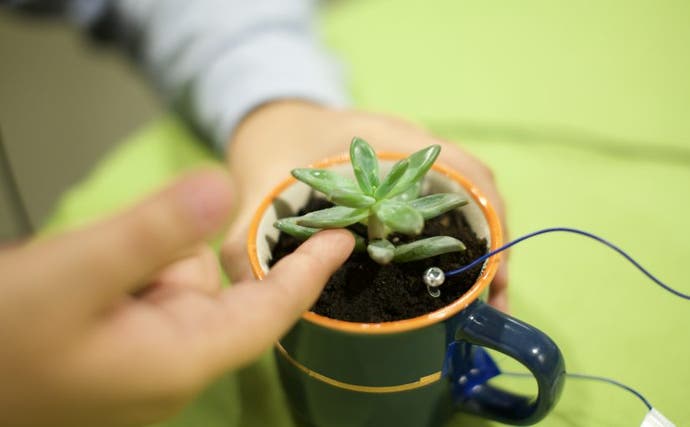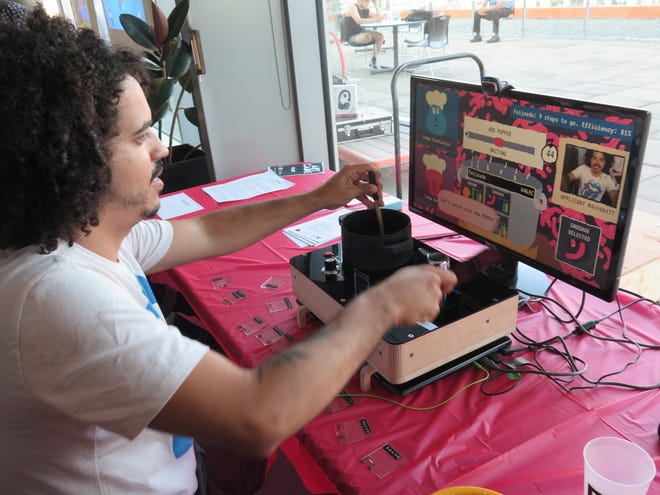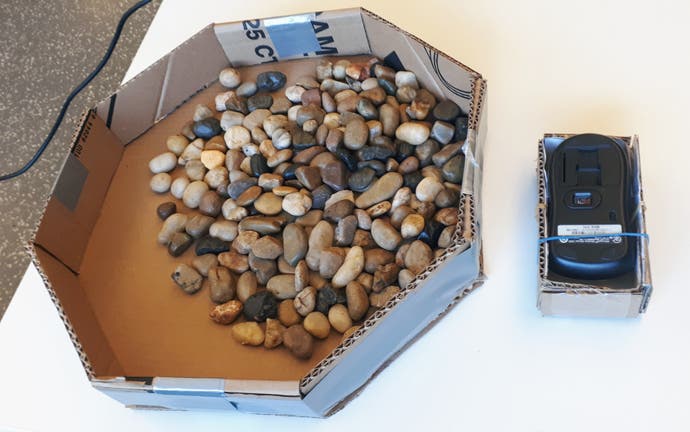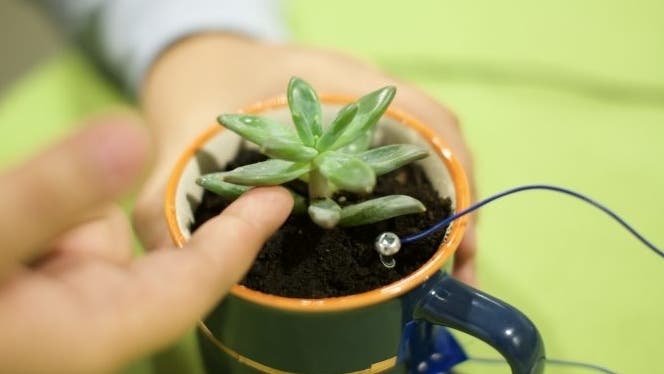Alternate controllers in a world we can't touch
A connection is made.
With Covid-19's devastating effects on travel, public movement, and basic physicality, video games have become a much-needed outlet for people to maintain a sense of connection and creativity. But while digital games and their platforms are surviving (and even thriving), other game subcultures are finding new challenges, particularly the world of alternate controllers, which often work with physical or hybrid games.
In 2013, Jess Marcotte had been designing games for less than half a year when they started a new project: a two-player game about a dangerous condition that can happen while scuba diving. Sometimes called "rapture of the deep," nitrogen narcosis happens when nitrogen builds up in the brain, causing confusion, poor judgment, and even euphoria. "Given that my coding skills were more limited at the time, I was able to use physical props to add complexity to the game instead," they recalled. The game required one player to wear scuba gear while playing tic-tac-toe with another person - a challenge when you're hampered by layers of bulky equipment.
"I think that first project showed me that there are a lot of effects that can't be reproduced digitally, or that can have more impact if they're physical," said Marcotte. "That's when I really became interested in what alt controls can do."
Free from the restraints of commercial off-the-shelf designs, alt controls can, in fact, do a lot. Mainstream controllers use limited variations of buttons and joysticks - familiar sets of configurations and symbols that we've absorbed into our collective knowledge. The major "console wars" between Microsoft and Sony have, in a sense, created basic visual languages for their respective fan bases. But while standardization allows mass production, it comes at a creative cost.
"Other media use dissonance and discomfort and ugliness to express truths about what it means to be human, yet there's often still this expectation in games that you must be having a fun, enjoyable, meticulously focus-tested experience at all times," explained Squinky, a new media artist and game designer who, along with Marcotte, is part of the queer game collective Soft Chaos. "Alt-ctrl games can work well as a way to subvert that expectation, by allowing players to engage with unusual materials and ways of moving."

Together, Squinky and Marcotte have made several alt-control games like rustle your leaves to me softly - a touch-based ASMR plant dating sim made for the 2017 Global Game Jam - and The Truly Terrific Traveling Troubleshooter, a hybrid roleplaying game that used soft materials to examine the way we value emotional labor. In the process of digitizing Troubleshooter to share on itch.io, Marcotte was a little disappointed at the loss of theatricality and "slow, contemplative touching" of the original experience, which revolved around the handmade contents of a carry-on suitcase with a digital interface.
"It's still possible to play the game [digitally], but the soft textile interfaces of the original game lent something to that feeling of being in a sort of magical environment, inside a different universe," Marcotte explained. "When an alt controller just works and it's not completely clear how it functions, when you're asked to touch something that isn't typically used as a computer interface, like a crocheted heart, or a textile fish...it feels different than clicking a button."
Alt controllers aren't just conduits to otherworldly experiences or unexplored emotional insights - they can also be used to ground gameplay in real-world rituals and practices. Brazilian game designer Enric Llagostera's Cook Your Way, for instance, features a custom cooking station controller that lets players emulate chopping and stirring, as if preparing a real meal. Part perverse cooking show, part immigration test, the game prompts players to wrestle with identity and culture within the robotic apparatus of a foreign government.
In a post-coronavirus world with closed borders, rising xenophobia, and increasingly displaced communities, Cook Your Way is a sharp critique of how white societies tend to commodify and fetishize migrant food cultures. The game's "visa application" requires players to follow three Brazilian recipes to prepare couve mineira (collard greens), calabresa (sausage) and feijoada completa (black bean and meat stew), but players can mod in their own recipes. It is truly a grim affront to think about preparing a cherished family dish - something so bound in the complexities of lived experiences and personal circumstances - as a performative test for immigration officials.

Developed in 2018, Cook Your Way is a particularly personal example of Llagostera's PhD research on political game design and alt controllers. While there's only one cooking station, he documented its creation to demystify game-making and encourage transparency. In light of Covid-19, he's also thinking about the types of materials he can get in his immediate environment. "The pandemic highlights restrictions of economic access, safety and presence," Llagostera said. "I think one way I'm engaging with it is focusing on this kind of distributed creation and replication of games with affordable materials, the customization of devices to players' needs, a focus on projects that live at a local scale."
As Covid-19 continues to reshape long-term reality, all three designers are adjusting to new social paradigms around touch and interaction. But as physical experiences move online, alt-control games aren't quite best served by digitization and virtual reality. "I don't think the best tactic to take here is necessarily to try and replicate alt-ctrl work in VR space," said Squinky. "At this point, I have yet to experience VR in a way that doesn't feel like an expensive tech demo. I'm more interested in working within the affordances digital environments provide that physical environments can't."
But alt controllers aren't just about expanding our mechanical experience of games - they're a vital part of telling marginalized stories with unique ways of interaction. In a 2018 research paper, Marcotte examined how alt controllers challenge mainstream game design, and their significance to queer gamemaking. Here, they define the verb queering as "reorienting, redirecting, deviating from and causing to deviate, altering the established heterosexist hegemony that has such a strong hold on mainstream games." Overall, this creates an experience that lends itself more to reflection and mindfulness as players are forced to engage with new narratives using a unique controller system. This same principle of alternative control also be applied to disabled players whose gaming options are limited to off-the-shelf controllers, which are often exclusionary by design.
For now, the future of alt controllers seems to rest squarely on the issue of preservation. "Projects, often unique artifacts, that are focused on physical co-location have to physically travel or be reconstructed locally, and there are many issues that impact the public's access to them: costs, funding, geographical inequality, borders, inaccessible interfaces, curatorial bias, and much more," said Llagostera. Documentation and preservation are crucial, but challenging. Marcotte, whose work often includes unique objects that can't be reproduced, is concerned about how physical items deteriorate or get thrown out. "There are so many games that have already been lost," they said. "The closest thing alt controllers have to an archive is ShakeThatButton.com, and that's wholly digital."

Digital documentation isn't just a matter of posterity, but to spread the word and empower more people to try making their own controllers. Llagostera's gambi_abo project - a free open-source Nintendo Labo-like system - encourages players to take a DIY approach to building their own controllers with cardboard. Gambi is a borrowed term from the Brazilian Portuguese word gambiarra, or kludge. While the cardboard may not last forever, the controllers are easily reproducible and use readily available material; gambi_abo's accessibility and simplicity also leaves room for experimentation and creativity.
The future might bring new stories about the scarcity and value of contact, as well as our relationship with isolation and distance. It's uncertain when or how we'll return to a pre-coronavirus world where touch and intimacy aren't associated with fear of death and disease; reduced freedom of movement and economic crises will also inevitably limit alt-controller game makers in their craft. "Folks might reuse more materials or make games with smaller budgets, probably circulating for smaller audiences and at a more local scale," said Llagostera. "This kind of local scale has a lot of political potential for grassroots game making and playing."
On an optimistic note, Squinky is using this time to explore their digital past, including nostalgic favorites like the LucasArts point and click adventures from the 1990s. "In a way, living my life more digitally feels a bit too easy, as though I'm cheating - as an autistic, trans, and racialized person, my relationship with the physical world has always been complicated," they said. "Now, there's this new layer of complication we all have to navigate, but in some ways, I feel better equipped to handle it than people who have maybe not, until this point, had to think quite as much about their relationship to the physical world."

